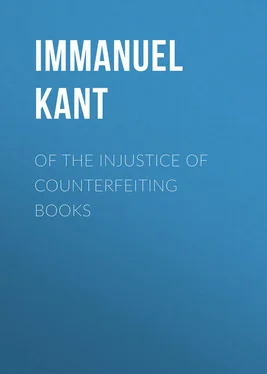Immanuel Kant - Of the Injustice of Counterfeiting Books
Здесь есть возможность читать онлайн «Immanuel Kant - Of the Injustice of Counterfeiting Books» — ознакомительный отрывок электронной книги совершенно бесплатно, а после прочтения отрывка купить полную версию. В некоторых случаях можно слушать аудио, скачать через торрент в формате fb2 и присутствует краткое содержание. Жанр: Философия, foreign_antique, foreign_prose, на английском языке. Описание произведения, (предисловие) а так же отзывы посетителей доступны на портале библиотеки ЛибКат.
- Название:Of the Injustice of Counterfeiting Books
- Автор:
- Жанр:
- Год:неизвестен
- ISBN:нет данных
- Рейтинг книги:5 / 5. Голосов: 1
-
Избранное:Добавить в избранное
- Отзывы:
-
Ваша оценка:
- 100
- 1
- 2
- 3
- 4
- 5
Of the Injustice of Counterfeiting Books: краткое содержание, описание и аннотация
Предлагаем к чтению аннотацию, описание, краткое содержание или предисловие (зависит от того, что написал сам автор книги «Of the Injustice of Counterfeiting Books»). Если вы не нашли необходимую информацию о книге — напишите в комментариях, мы постараемся отыскать её.
Of the Injustice of Counterfeiting Books — читать онлайн ознакомительный отрывок
Ниже представлен текст книги, разбитый по страницам. Система сохранения места последней прочитанной страницы, позволяет с удобством читать онлайн бесплатно книгу «Of the Injustice of Counterfeiting Books», без необходимости каждый раз заново искать на чём Вы остановились. Поставьте закладку, и сможете в любой момент перейти на страницу, на которой закончили чтение.
Интервал:
Закладка:
Immanuel Kant
Of the Injustice of Counterfeiting Books / From: Essays and Treaties on Moral, Political and various Philosophical Subjects
Of The Injustice of Counterfeiting Books
Those who consider the publication of a book to be equivalent to the use of an author's property in the form of a copy (whether the possessor came by it as a manuscript from the author or as a transcript of it from an actual editor), and then, however, via the reservation of certain rights, whether of the author's or of the editor's, who is appointed by the author, want to limit the use of the book only to this, that is, want to impose the rule that it is not permitted to counterfeit the book, cannot, based upon the rationale of this aforementioned consideration, attain this anti-counterfeiting objective. For the author's property in his thoughts or sentiments (even if it were not granted that the concept of such thought or sentiment property has legal merit according to external laws) would remain to him regardless of whether or not that property was used or represented in the form of a counterfeit; and, since an express legal consent given by the purchaser of a book to such a limitation of their property would not likely be granted, 1 1 Would an editor attempt to bind everybody who purchased his work to the condition, to be accused of embezzling the property of another entrusted to him, if, either intentionally, or by the purchaser's lack of oversight, the copy which the purchaser purchased were used for the purpose of counterfeiting? Scarcely anyone would consent to this: because he would thereby expose himself to every sort of trouble about the inquiry and the defense. The work would therefore remain exclusively in the editor's hands.
how much less would a merely presumed consent suffice to determine the purchaser's obligation?
I believe, however, that I am justified to consider the publication of a book to be not the trading of a good [in the form of a book] in the trader's own name, but as the transacting of business in the name of another, namely, the author. [By considering the act of publication to be such a transaction], I am able to represent easily and distinctly the wrongfulness of counterfeiting books. My argument, which also proves the editor's right, is contained in a ratiocination; after which follows a second, wherein the counterfeiter's pretension shall be refuted.
Whoever transacts another's business in his name and yet against his will is obliged to give up to him, or to his attorney, all the profits that may arise therefrom, and to repair all the loss which is thereby occasioned to either the one or the other.
Now the counterfeiter is he who transacts another's business (the author's) against the other's will. Therefore the counterfeiter is obliged to give up to the author or to his attorney (or the editor) [any profits from the transaction].
As the agent, who intrudes himself, acts in the name of another in a manner not permitted, he has no claim to the profit which arises from this business; but the author or editor in whose name he carries on the business, or another authorized controller of the work to whose charge the former has committed the work, possesses the right to appropriate this profit to himself, as the fruit of his property. Besides, as this agent injures the possessor's right by intermeddling, "nullo jure," in another's business, he must of necessity compensate for all damages sustained. This lies without a doubt in the elementary conceptions of natural right.
The first point of the minor is: that the editor transacts the business of the author by the publication. Here, everything depends on the conception of a book, or of a writing in general, as a labour of the author's, and on the conception of the editor in general (be he an attorney or not). Whether a book be a commodity which the author, either through the author's own efforts or by means of another, can traffic with the public, and can therefore transfer the ownership rights of the book, either with or without reservation of certain rights; or whether the book is instead a mere use of his works, which the author can indeed concede to others, but never transfer the ownership rights of; Again: whether the editor transacts his business in his own name, or transacts another's business in the name of another?
In a book, as a writing, the author speaks to his reader; and he who printed it speaks by his copies not for himself, but entirely in the name of the author. The editor exhibits the author as speaking publicly, and mediates only the delivery of this speech to the public. Let the copy of this speech, whether it be in handwriting or in print, belong to whom it will; yet to use this for one's self, or to traffic with it, is a business which every owner of it may conduct in his own name and at pleasure. But to let any one speak publicly, to publish his speech as such, means to speak in his name, and, in a way, to say to the public:
"A writer lets you know, or teaches you, this or that, etc., through me. I answer for nothing, not even for the liberty, which the writer takes, to speak publicly through me; I am but the mediator of the writer's thoughts coming to you."
That is no doubt a business which one can execute only in the name of another, and never in one's own (as editor). The editor furnishes in his own name the mute instrument of the delivering of a speech of the author's to the public; 2 2 A book is the instrument of the delivering of a speech to the public, not merely of the thoughts, as pictures of a symbolical representation of an idea or of an event. What is here the most essential about it is that it is not a thing, which is thereby delivered, but is rather an opera, namely a speech, and certainly literal. In naming it a mute instrument, I distinguish it from what delivers the speech by a sound, such as a trumpet in music, or the mouths of others.
Конец ознакомительного фрагмента.
Текст предоставлен ООО «ЛитРес».
Прочитайте эту книгу целиком, купив полную легальную версию на ЛитРес.
Безопасно оплатить книгу можно банковской картой Visa, MasterCard, Maestro, со счета мобильного телефона, с платежного терминала, в салоне МТС или Связной, через PayPal, WebMoney, Яндекс.Деньги, QIWI Кошелек, бонусными картами или другим удобным Вам способом.
1
Would an editor attempt to bind everybody who purchased his work to the condition, to be accused of embezzling the property of another entrusted to him, if, either intentionally, or by the purchaser's lack of oversight, the copy which the purchaser purchased were used for the purpose of counterfeiting? Scarcely anyone would consent to this: because he would thereby expose himself to every sort of trouble about the inquiry and the defense. The work would therefore remain exclusively in the editor's hands.
2
A book is the instrument of the delivering of a speech to the public, not merely of the thoughts, as pictures of a symbolical representation of an idea or of an event. What is here the most essential about it is that it is not a thing, which is thereby delivered, but is rather an opera, namely a speech, and certainly literal. In naming it a mute instrument, I distinguish it from what delivers the speech by a sound, such as a trumpet in music, or the mouths of others.
Интервал:
Закладка:
Похожие книги на «Of the Injustice of Counterfeiting Books»
Представляем Вашему вниманию похожие книги на «Of the Injustice of Counterfeiting Books» списком для выбора. Мы отобрали схожую по названию и смыслу литературу в надежде предоставить читателям больше вариантов отыскать новые, интересные, ещё непрочитанные произведения.
Обсуждение, отзывы о книге «Of the Injustice of Counterfeiting Books» и просто собственные мнения читателей. Оставьте ваши комментарии, напишите, что Вы думаете о произведении, его смысле или главных героях. Укажите что конкретно понравилось, а что нет, и почему Вы так считаете.












